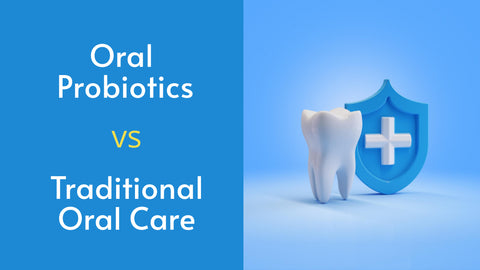Oral Probiotics vs. Traditional Oral Care: A Comprehensive Comparison of Effectiveness

Introduction
Oral care is an essential part of maintaining a healthy lifestyle, and with so many options available, it can be challenging to determine the best approach for your oral hygiene routine. Among the many products on the market, oral probiotics have emerged as a popular alternative to traditional oral care. But how do they compare to conventional oral care products like toothpaste, mouthwash, and dental floss? In this blog post, we will examine the effectiveness of oral probiotics and how they stack up against traditional oral care methods.
Oral Probiotics: The Basics
Oral probiotics are beneficial bacteria that are specifically tailored to support oral health. They are typically available in lozenge, chewable tablet, or powder form and can be consumed daily. Oral probiotics work by introducing friendly bacteria into the mouth, which can help to maintain a balanced microbiome, prevent plaque buildup, and reduce the risk of oral diseases.
The Science Behind Oral Probiotics
The primary goal of oral probiotics is to restore and maintain a healthy balance of bacteria in the mouth. This balance is essential for preventing oral health issues like cavities, gum disease, and bad breath. By introducing beneficial bacteria, oral probiotics can help reduce the number of harmful bacteria in the mouth, thus decreasing the risk of oral health problems. Several studies have shown that oral probiotics can indeed positively impact oral health. For example, research has found that specific strains of probiotics can reduce the presence of cavity-causing bacteria, such as Streptococcus mutans. Other studies have demonstrated that probiotics can improve gum health and reduce inflammation associated with gingivitis.
Traditional Oral Care: The Tried-and-True Approach
Traditional oral care products, such as toothpaste, mouthwash, and dental floss, have been widely used for decades to maintain oral hygiene. They work by mechanically removing food debris and bacteria from the mouth, while mouthwash also helps kill bacteria. However, mouthwash also killed all beneficial bacteria in your mouth. Toothpaste typically contains fluoride, which is a proven cavity fighter. Dental floss aids in removing food particles and bacteria that build up between teeth and along the gumline, which can lead to gum disease if left unchecked. Mouthwash is used as a rinse to kill bacteria, freshen breath, and often provide additional fluoride.
Effectiveness: Oral Probiotics vs. Traditional Oral Care
Plaque Removal and Prevention
Traditional oral care products, such as toothpaste and dental floss, are designed to mechanically remove plaque from the teeth and gums. Oral probiotics, on the other hand, work by creating a balanced oral microbiome, which can help prevent plaque from forming in the first place. While probiotics can be effective at reducing plaque buildup, they are not a substitute for the mechanical plaque removal provided by toothpaste and dental floss.
Bad Breath
Bad breath is often caused by the presence of harmful bacteria in the mouth. Traditional oral care products, such as mouthwash, can temporarily mask bad breath by killing bacteria. However, this effect is often short-lived, as the mouth quickly repopulates with bacteria. Oral probiotics, on the other hand, can help reduce bad breath by populating the mouth with beneficial bacteria, which can compete with and inhibit the growth of odor-causing bacteria.
Gum Health
Oral probiotics have been shown to help improve gum health by reducing inflammation and promoting a healthy balance of bacteria in the mouth. Traditional oral care products, such as toothpaste and dental floss, can also contribute to healthier gums through regular removal of plaque and bacteria. However, some mouthwashes that contain alcohol or harsh chemicals may exacerbate gum irritation and should be used with caution.
Oral Disease Prevention
Traditional oral care products are essential for maintaining good oral hygiene and preventing oral diseases like cavities and gingivitis. However, they may not always be sufficient to address the underlying imbalance of oral bacteria. Oral probiotics have the potential to enhance the effectiveness of traditional oral care by maintaining a balanced oral microbiome and reducing the risk of oral diseases.
Conclusion
Oral probiotics offer an exciting new avenue for oral health maintenance, but they should be used in conjunction with traditional oral care methods. By combining the benefits of toothpaste and dental floss with the support of oral probiotics, you can help maintain a healthy oral environment and reduce your risk of oral health issues.








